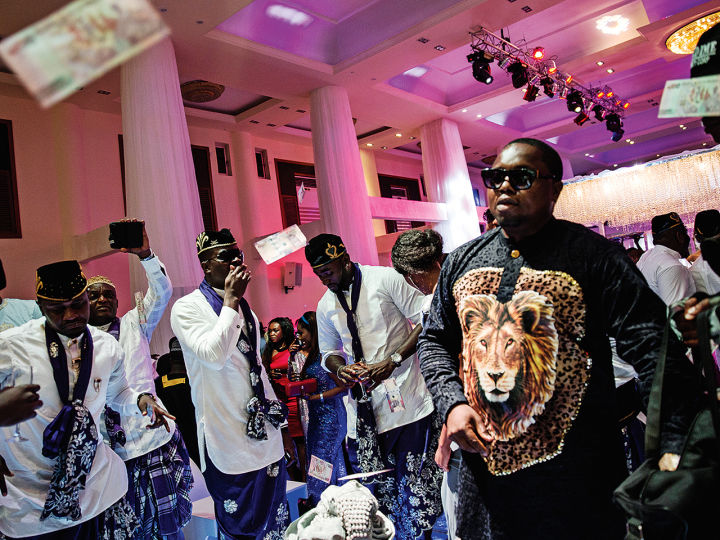Events
Playboy features Lagos Nightlife – Asks “Is Lagos the Most Dangerous Party City on the Planet?”

Ubi Franklin’s Wedding – Playboy Caption: “A posh wedding in Lekki filled with guests from the music and film industries and complete with “spraying”— throwing money in the air in the bride and groom’s direction.” | Photo Credit: Glenna Gordon
A Playboy Magazine reporter Adam Skolnick spent 10 days in Lagos, where he “sought out every party (he) could find” from Obalende to Quilox in VI, from Sip Lounge to New Afrika Shrine.
In his time in the city, he spent time with Femi and Seun Kuti, Mavin Records’ A&R Bizzle Osikoya, saw Burna Boy, DJ Obi, DJ Caise and a number of other entertainment industry heavyweights.
Although he has been to 45 countries on six continents, he found Lagos had an “authentic flavour”. He described the city, talked about its crime, poverty, the kind of music Nigerians like and more.
He claims Lagos Island is home to Lagos’ largest market and biggest red light district
Lagos is certainly cinematic, but it isn’t pretty. A massive jigsaw of moldering concrete with almost no greenery, it is the largest city in Africa by population. Although it incorporates dozens of neighborhoods, the city breaks into roughly two sections: the Island and the mainland. The Island is set across a wide brackish lagoon from the mainland and connected with three separate bridges.
Although just one landmass, it’s home to several neighborhoods, including Victoria Island, Lekki and Ikoyi, where the high-end nightlife and shopping happen, as well as some tough neighborhoods, including Lagos Island, home to the city’s largest market and its roughest red light district.
On Crime and Poverty in Lagos
So much of life in Lagos is a struggle for the average guy and even more difficult for poor Nigerian girls growing up in cramped confines where sexual violence is commonplace. Credit is extraordinarily difficult to obtain, and even my own credit cards were cut off after one or two charges in Lagos. As a result, the city runs on cash, which makes it almost impossible to transcend poverty. That’s why you see Lagosians of all ages selling anything and everything they can find at roadside intersections and even on the expressways when traffic grinds to a halt. One industrious little girl alternated between doing her homework on the curbside as traffic roared and slaloming among moving cars to sell bags of groundnuts when it slowed enough for commerce. Meanwhile, plenty of Lagosians, caught in their city’s unforgiving economic grip, stray toward crime instead.
On the Music Nigerians Like
Seun and Femi take after their father. Their music is political, entrancing and immersive, and has an audience both at home and abroad. But like Fela’s, their songs can stretch to over 10 minutes, which means they aren’t hit makers, and when young Nigerians dream about becoming pop stars, they don’t imagine themselves as Fela’s kids. They want to be Wizkid.
One of Nigeria’s biggest pop stars, Wizkid grew up hanging out on the street corners of Ojuelegba—a working-class Lagosian transport hub teeming with beat-up canary yellow minivans and tricked-out three-wheeled keke napep (Nigerian tuk-tuks). It’s an all-hours marketplace, rife with petty crime and prostitution. That’s where he spent his free time, rhyming and dancing for hours on end, checking out the girls and absorbing the struggle. At night he hung out in low-rent recording studios and eventually laid down some tracks. His stardom was immediate, and local kids across the city don’t just dream of following in his footsteps, they’re hustling to get there.
You can read the entire article on Playboy by clicking here.
Photo Credit: Glenna Gordon

















